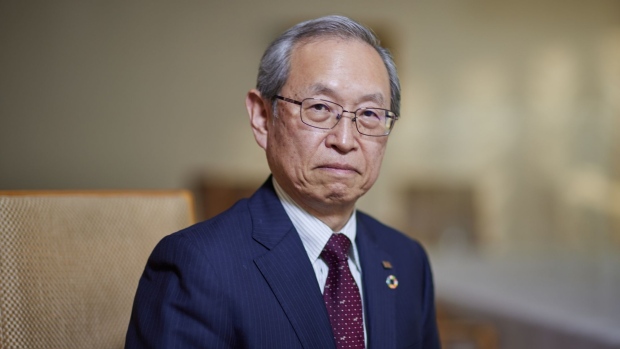Apr 13, 2022
Toshiba’s Talk of Privatization Leaves Some Analysts With Doubts
, Bloomberg News

(Bloomberg) -- The statement last week read like a possible change of direction for Toshiba Corp., sending its shares higher.
The Japanese conglomerate will set up a special committee that will, among other things, “identify the privatization offer that is best for our diverse stakeholders,” it said.
Toshiba will also halt its plan to split into two companies, temporarily suspend the sale of non-core operations, and create a new business roadmap to be announced before its shareholder meeting in June.
As investors pushed up the stock on bets the company would be sold to private equity, some analysts took a more measured stance: Yes, a privatization is now more likely, but it’s far from a sure thing.
It’s “much more realistic than earlier,” said Mio Kato, an analyst at LightStream Research in Tokyo. “It needs the government’s blessing, though, and it’s not clear yet whether it will receive that.”
Toshiba has lurched from one drama to another as management and the government face off against shareholders who have become disillusioned by years of scandals and financial mismanagement.
While executives had sought to split the company in three, and then two, as a way forward, shareholders voted down the idea of a breakup last month. For Toshiba’s activist investors, who own a large chunk of the shares, going private appears to be the best solution, one that would presumably offer them a windfall.
Toshiba has set up a special committee to engage with potential investors and sponsors and review strategic alternatives, but no specific option, including privatization, has been decided yet, a spokeswoman said. The company will work to build trust with shareholders, she said.
But at this point, Toshiba has no easy option. Doing nothing won’t wash with its stock holders, splitting in two has been rejected, and going private comes with one big obstacle: it’s dependent on the government giving its blessing. Japan’s authorities list Toshiba, with its expertise in nuclear power, as a company of interest to national security under the Foreign Exchange and Foreign Trade Act.
As recently as February, then-chief executive officer Satoshi Tsunakawa argued that going private would be a mistake because of the many drawbacks. For starters, Toshiba would have to sell off sensitive technology operations and would lose orders from public entities such as utilities and local governments, he said.
For Naoki Fujiwara, chief fund manager at Shinkin Asset Management Co. in Tokyo, the success of any takeover bid will ultimately depend on who is bidding.
“It’s possible for a foreign fund to team up with a Japanese fund,” Fujiwara said. “That would make things easier.”
Toshiba is in talks with financial institutions on a buyout plan that would be led by domestic investors, the Nikkei newspaper reported in late March, sending the company’s shares higher. A Toshiba spokesman said at the time that the company hadn’t made any decision yet.
Days later, another potential bidder emerged, this time from overseas. Effissimo Capital Management Pte., Toshiba’s largest shareholder with a 9.9% stake, said it had agreed to tender all its shares if Bain Capital launched a tender offer to acquire two-thirds or more of Toshiba. Bain said nothing had been decided about any tender offer.
“It will be done with a Japanese entity,” said Justin Tang, head of Asian research at United First Partners in Singapore. “The nuclear and defense assets have to be ringfenced.”
Tang is one of the optimists on privatization.
“It is quite clear that this is the only option on the table to turn the fortunes of the company around,” he said.
But Kato of LightStream is much less confident.
“I don’t think privatization is the most likely outcome,” he said. “I would say maybe a 30% chance.”
The divergence of opinions is a reflection of the uncertainties surrounding the company over the past seven years.
It started with an accounting scandal in 2015 that hurt its bottom line and led to a company-wide restructuring. The subsequent unraveling of a costly foray into nuclear power business in the U.S. led to a $6.3 billion writedown and saw it teeter on the edge of delisting. It was forced to sell its crown jewel memory-chip unit and offer stock that was snapped up by the activists, giving them an outsized presence on the shareholder register.
When Effissimo sought in 2020 to put one of its co-founders and other candidates on Toshiba’s board, shareholders rejected it. Suspicious about how the vote was conducted, Effissimo proposed that independent investigators be appointed to look into it, winning a landmark shareholder vote last year. The subsequent report by the investigators alleged that Toshiba management worked hand in hand with government allies to sway the outcome, findings that four Toshiba board members described as “deeply disturbing.”
In November, Toshiba floated a plan to split into three companies as part of a strategic restructuring. But it soon faced opposition from shareholders. In February, the company said it was scrapping the initial idea and would separate into two companies instead. But at an extraordinary general meeting on March 24, shareholders rejected that proposal -- and a competing one from a large investor to reconsider options including a sale.
Atsushi Osanai, a professor at Waseda Business School in Tokyo, says Toshiba’s executives are improvising as they go along.
“All the proposals by management so far are clearly stopgap measures hoping shareholders would one day be satisfied,” he said. “As long as management keeps the current backward-looking attitude toward its stakeholders, no other options, including privatization, will win their approval.”
But Tang of United First Partners cautions that Toshiba’s directors no longer have any room to maneuver. Privatization, he argues, is now the only option, however difficult it may be.
“The board does not have a choice,” he said.
©2022 Bloomberg L.P.





